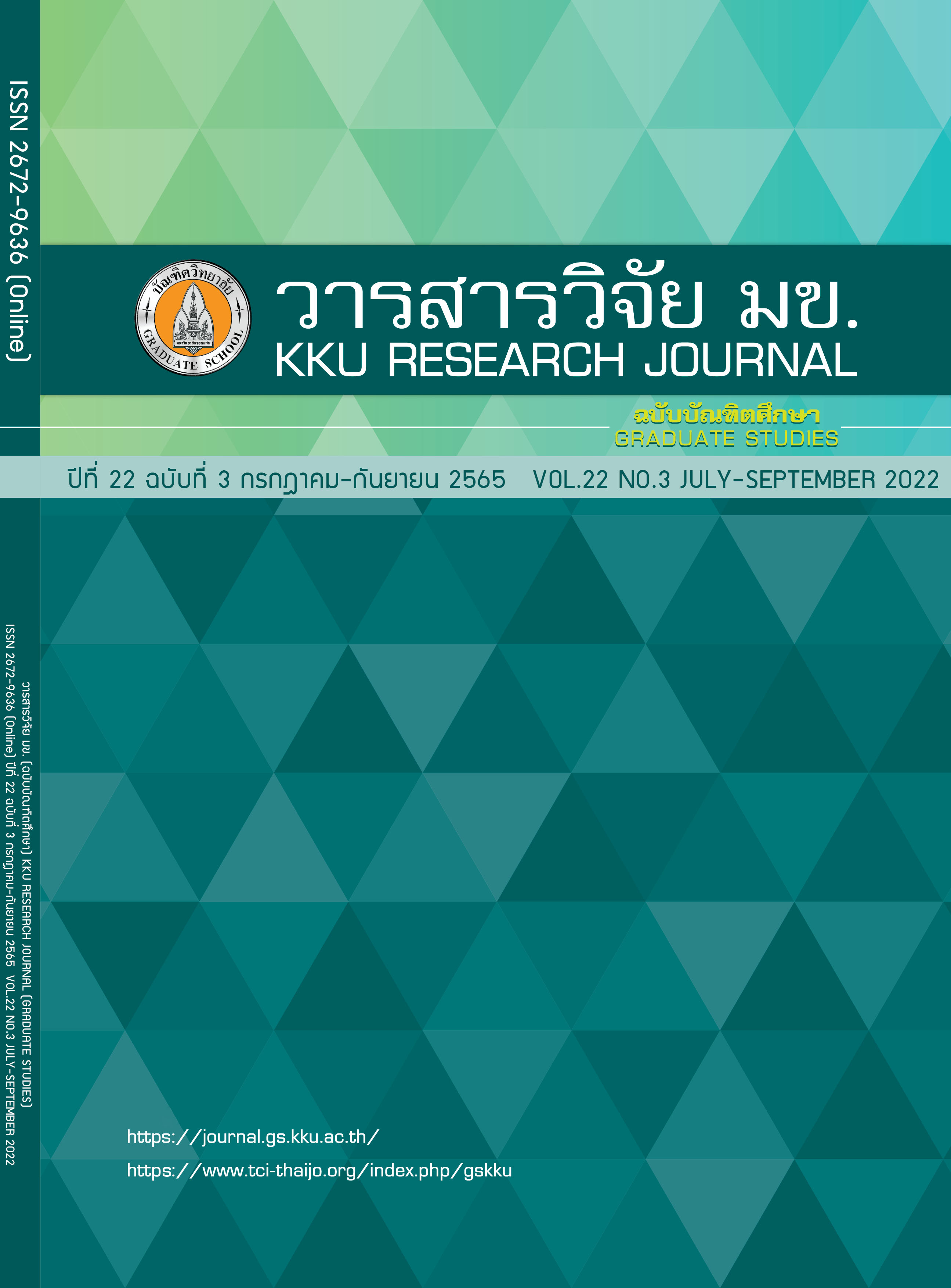The Effect of Using a set of Parent Assisted Math Games for Encouraging Math Basic Skill in Early Childhood Who are at Risk of Mathematics Learning Disability
Keywords:
The set of parent assisted math games, Early childhood, Mathematics learning disabilityAbstract
This was a quasi-experimental research study with an objective to develop and study the effects of a set parent-assisted math games for encouraging basic mathematical skills of early childhood children who are at risk of mathematics learning disability. The sample consisted of preschool children who are at risk of mathematics learning disability aged between 5-6 years old studying in kindergarten 2 at Nakhon Phanom Kindergarten school and parents of these children participating in the research. The sample group was selected by purposive sampling 20 children divided into the experimental group and the control group 10 each. The research instruments consisted of 1) a set of parent-assisted math games and 2) a screening form to assess the risk of learning disability in mathematics. The data were analyzed using descriptive statistics with mean, standard deviation, minimum-maximum and t-test statistics. The results found that 1) A set of parent-assisted math games developed by the researcher showed the index of conformity (IOC) was 0.84 and the results of the expert opinion agreement analysis found that the overall average was 3.94 and the standard deviation was 0.45 at a high appropriate level. 2) After applying a set of parent-assisted math games math skills in early childhood children who are at risk of mathematics learning disability can be promoted, statistically significant level .05
References
Kanvipa H. The Developmental Package for Promoting Development of Children with Dyslexia in Early Stage. Journal of Ratchasuda College for Research and Development of Persons with Disabilities. 2020; 17(1).
Piyasil V, Wangtan S. Learning Disorders and Comorbidity. J ThePsychiatric Assoc Thail . 2015;60(4):287–96. Thai.
Techapoonpon K. Specific Learning Disorder with Impairment in Mathematics (Dyscalculia). Vajira Med J J Urban Med [Internet]. 2018;62(3):33–44. Available from: http://dx.doi.org/10.14456/ vmj.2018.45. Thai.
Irwin V, NCES; Zhang J, Wang X, Hein S, Wang K, Roberts A, et al. Students With Disabilities. The Condition of Education [Internet]. 2021. [cited 2021 may 30]. Available from: https://nces.ed.gov/programs/coe/pdf/2021/cgg_508c.pdf
Department of Mental Health Ministry of Public Health. Annual Report 2020, Nonthaburi: Department of Mental Health Ministry of Public Health; 2020.
Waentuearong J. Summary and report on the results of basic national educational testing O-NET, Nakhon Phanom Primary Education Service Area office 1 [Internet]. 2020. [cited 2021 may 5]. Available from: junpen.esdc.go.th.
Sad SN, Kıs A, Demir M, Ozer N. Meta-analysis of the relationship between mathematics anxiety and mathematics achievement. Pegem Eğitim ve Ogretim Derg. 2016 Jun 8;6(3).
Umaporn T, Family therapy andfamily counseling, Bangkok: Thai Family Research and Development Center; 2011.
ThongSriratch T. Learning disorder (learning disabilities) [Internet]. The Royal College of Pediatricians of Thailand & Pediatric Society of Thailand. [cited 2020 Aug 11]. Available from: http://www.thaipediatrics.org/Media/media-20161215143257.pdf. Thai
Casey BM, Caola L, Bronson MB, Escalante DL, Foley AE, Dearing E. Maternal use of math facts to support girls’ math during card play. J Appl Dev Psychol. 2020 May;68.
Wongupparaj P, Kadosh RC. Predicting mathematical abilities from early mathematics and number- speci_c executive functions in informal and formal schooling. Res [Internet]. 2021 [cited 2021 May 12];1–13. Available from: https://www.researchgate.net/publication/351550962_Predicting_mathematical_abilities_from_early_mathematics_and_numberspecific_executive_functions_in_informal_and_formal_schooling. Thai.
Cornoldi C, Carretti B, Drusi S, Tencati C. Improving problem solving in primary school students: The effect of a training programme focusing on metacognition and working memory. Br J Educ Psychol. 2015 Sep;85(3).
Tantipalachiwa K. Learning activities for early childhood. Bangkok : Edison Press Products.; 2001.
Katavanich T. General Psychology . Se-Education. Bangkok; 2003.
Phothisuwan M, Kusol K, Eksirinimit T. The effects of family potential support program on the learning ability of students with learning disabilities. Journal of Mental Health of Thailand 20AD;28:98–187. Thai.
Goswami U, Kongchaimongkhon W, Luadlai S. Child Psychology: A Very Short Introduction ( Thai version). Bookscape. Bangkok: 2562.
Phungluang B. promoting mathematics basic skill of yong children by fun activitys with parent. Suan Dusit Grad Sch Acad J. 2014;10(1). Thai.
Downloads
Published
Issue
Section
License
Copyright (c) 2022 KKU Research Journal (Graduate Studies)

This work is licensed under a Creative Commons Attribution-NonCommercial-NoDerivatives 4.0 International License.



